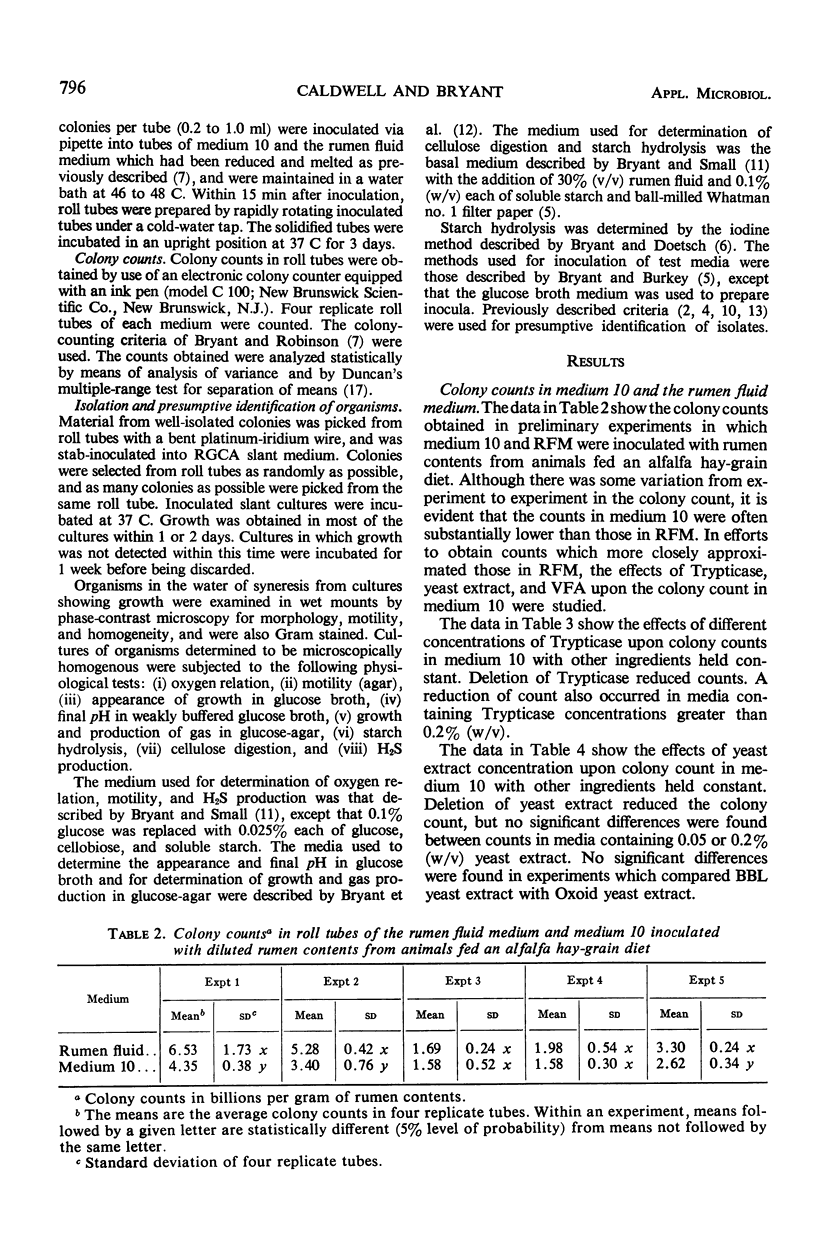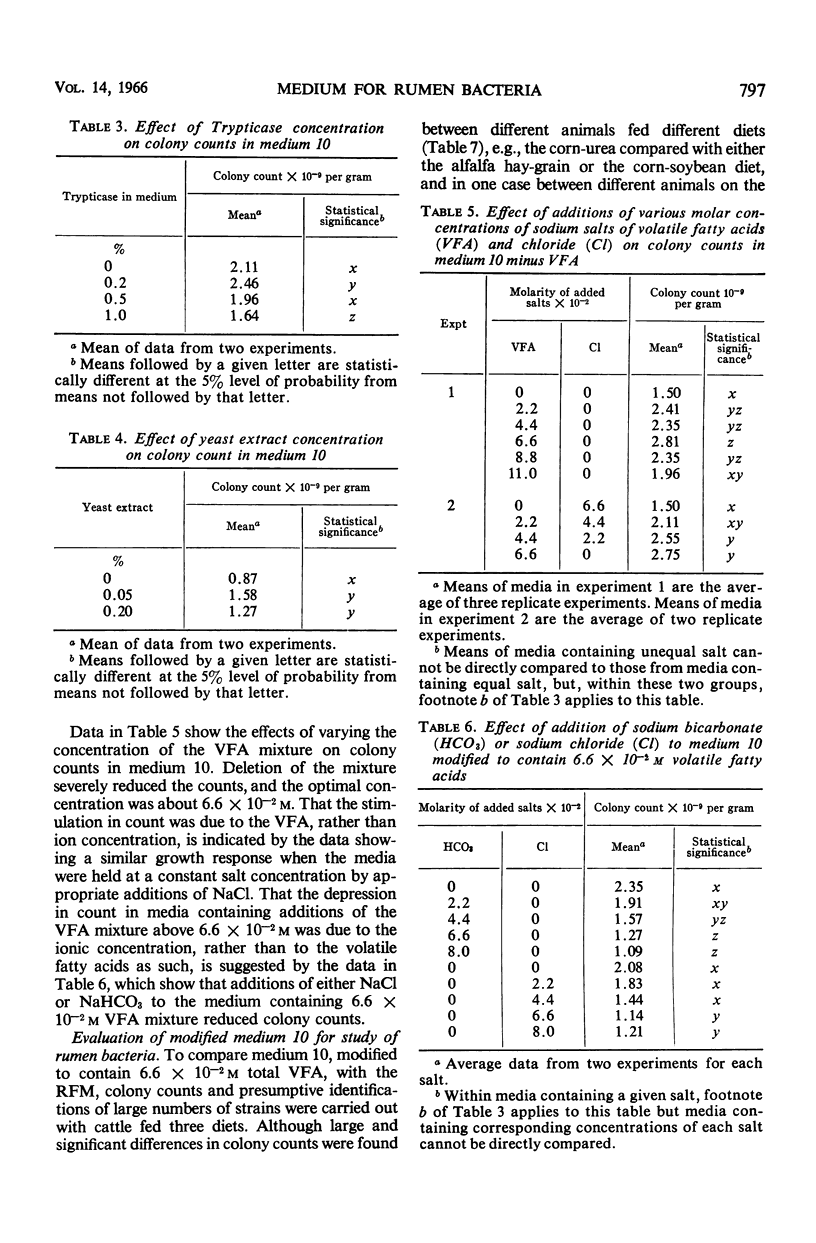Abstract
Colony counts which approximated those in a habitat-simulating, rumen fluid-agar medium (RFM) were obtained in medium 10, a medium identical to the RFM except for the replacement of rumen fluid with 1.5 × 10-6m hemin, 0.2% Trypticase, 0.05% yeast extract, and a 6.6 × 10-2m volatile fatty acid mixture qualitatively and quantitatively similar to that in rumen fluid. Single deletion of Trypticase, yeast extract, or the volatile fatty acid mixture from medium 10 significantly reduced colony counts. Colony counts were also reduced when medium 10 was modified to contain higher concentrations of Trypticase or volatile fatty acids. Significant differences were found between colony counts obtained from diluted rumen contents of animals fed a cracked corn-urea diet, and the colony counts obtained from animals fed either a cracked corn-soyean oil meal or an alfalfa hay-grain diet. Qualitative differences were found between the predominant bacterial strains isolated from rumen contents of animals fed cracked corn diets and strains isolated from animals fed alfalfa hay-grain. Regardless of differences in the predominant flora associated with diet, medium 10 and the RFM supported growth of similar bacterial populations. The results show that medium 10 is suitable for enumeration and isolation of many predominant rumen bacteria.
Full text
PDF







Selected References
These references are in PubMed. This may not be the complete list of references from this article.
- BRYANT M. P., ROBINSON I. M., LINDAHL I. L. A note on the flora and fauna in the rumen of steers fed a feedlot bloat-provoking ration and the effect of penicillin. Appl Microbiol. 1961 Nov;9:511–515. doi: 10.1128/am.9.6.511-515.1961. [DOI] [PMC free article] [PubMed] [Google Scholar]
- BRYANT M. P., ROBINSON I. M. Some nutritional characteristics of predominant culturable ruminal bacteria. J Bacteriol. 1962 Oct;84:605–614. doi: 10.1128/jb.84.4.605-614.1962. [DOI] [PMC free article] [PubMed] [Google Scholar]
- BRYANT M. P., SMALL N., BOUMA C., CHU H. Bacteroides ruminicola n. sp. and Succinimonas amylolytica; the new genus and species; species of succinic acid-producing anaerobic bacteria of the bovine rumen. J Bacteriol. 1958 Jul;76(1):15–23. doi: 10.1128/jb.76.1.15-23.1958. [DOI] [PMC free article] [PubMed] [Google Scholar]
- BRYANT M. P., SMALL N. The anaerobic monotrichous butyric acid-producing curved rod-shaped bacteria of the rumen. J Bacteriol. 1956 Jul;72(1):16–21. doi: 10.1128/jb.72.1.16-21.1956. [DOI] [PMC free article] [PubMed] [Google Scholar]
- Bladen H. A., Bryant M. P., Doetsch R. N. A Study of Bacterial Species from the Rumen Which Produce Ammonia from Protein Hydrolyzate. Appl Microbiol. 1961 Mar;9(2):175–180. doi: 10.1128/am.9.2.175-180.1961. [DOI] [PMC free article] [PubMed] [Google Scholar]
- Bryant M. P., Robinson I. M. Studies on the Nitrogen Requirements of Some Ruminal Cellulolytic Bacteria. Appl Microbiol. 1961 Mar;9(2):96–103. doi: 10.1128/am.9.2.96-103.1961. [DOI] [PMC free article] [PubMed] [Google Scholar]
- Caldwell D. R., White D. C., Bryant M. P., Doetsch R. N. Specificity of the heme requirement for growth of Bacteroides ruminicola. J Bacteriol. 1965 Dec;90(6):1645–1654. doi: 10.1128/jb.90.6.1645-1654.1965. [DOI] [PMC free article] [PubMed] [Google Scholar]
- HOBSON P. N., MANN S. O. The isolation of glycerol-fermenting and lipolytic bacteria from the rumen of the sheep. J Gen Microbiol. 1961 Jun;25:227–240. doi: 10.1099/00221287-25-2-227. [DOI] [PubMed] [Google Scholar]
- HUNGATE R. E., BRYANT M. P., MAH R. A. THE RUMEN BACTERIA AND PROTOZOA. Annu Rev Microbiol. 1964;18:131–166. doi: 10.1146/annurev.mi.18.100164.001023. [DOI] [PubMed] [Google Scholar]
- SMITH P. H., HUNGATE R. E. Isolation and characterization of Methanobacterium ruminantium n. sp. J Bacteriol. 1958 Jun;75(6):713–718. doi: 10.1128/jb.75.6.713-718.1958. [DOI] [PMC free article] [PubMed] [Google Scholar]


